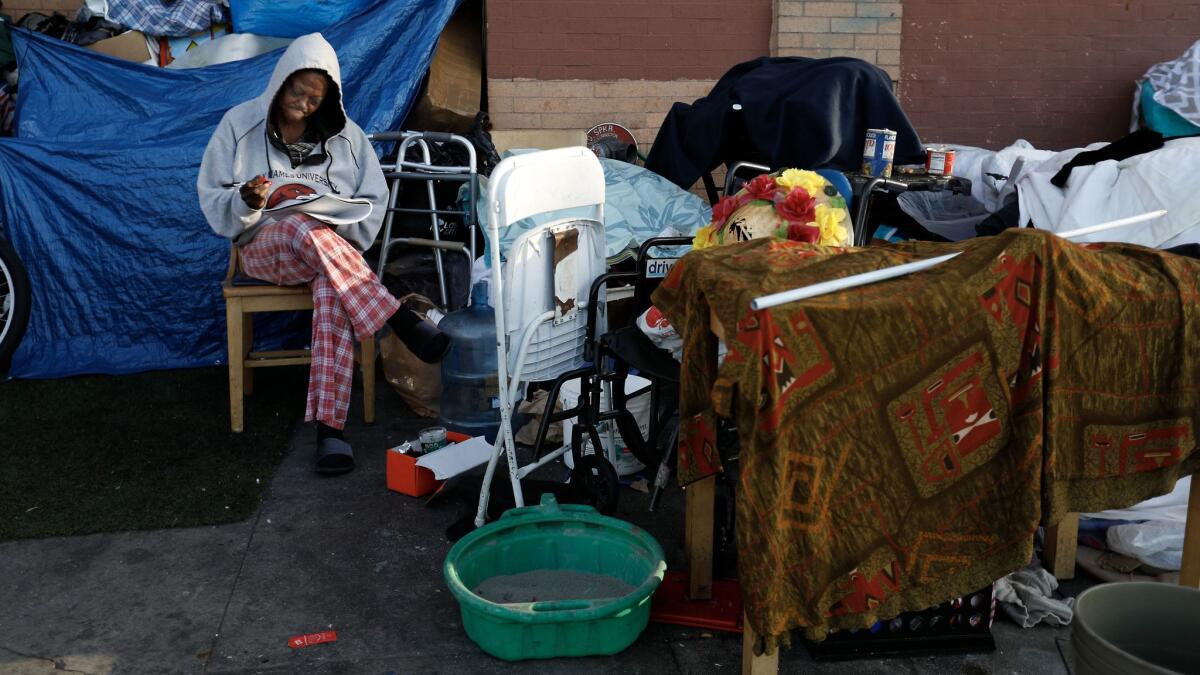$2 billion to help house California’s homeless isn’t being spent — and no one knows when it will be

Nearly two years after California lawmakers approved a $2-billion bond to help finance new housing for the state’s homeless, not a penny has been spent, and it’s unclear when any of the money will be available.
The dollars are tied up in court as a Sacramento attorney challenges the state’s plan to pay off that debt with money California voters approved in 2004 for mental health services. The funding, the attorney contends, should not be diverted from treatment programs, even if the mentally ill benefit from the housing. State housing officials said they don’t know how long the litigation will take to resolve.
The delay is causing deep frustrations. Over the last year, homelessness increased nearly 14% in California and now affects more than 130,000 people in the state — a quarter of the nation’s homeless population. The lack of funds is slowing the amount of housing that can be built, said Ruth Schwartz, co-founder and executive director of the Los Angeles nonprofit Shelter Partnership.
“We’re all disappointed because the need is immediate,” Schwartz said.
The idea for the homeless housing program originated in January 2016. State Senate President Pro Tem Kevin de León (D-Los Angeles) proposed a $2-billion bond to finance new and rehabilitated housing for mentally ill people living on the streets.
Money to repay the loan would come from revenue generated by Proposition 63, a 1% income tax surcharge on millionaires passed in 2004 that funds mental health services. De León and other supporters argued building housing for chronically homeless people with mental illness met the intent of the 2004 initiative. Gov. Jerry Brown signed a pair of bills authorizing the bond in summer 2016.
But litigation stalled the effort. Mary Ann Bernard, an attorney from Sacramento, said the proposal is illegal. The California Constitution typically requires voter approval for all bond measures, and Proposition 63 didn’t specify financing housing construction as one of the ways money could be spent.
Bernard is relying on a 2006 letter from the state attorney general’s office that cast doubt on a prior proposal to spend the mental health dollars on housing bonds, a plan that was later abandoned.
“We conclude that strong arguments would support a finding by a court that the securitization of funding from Proposition 63 to issue housing bonds for mentally ill homeless individuals is inconsistent with the intent of Proposition 63 and that any state contract to secure these bonds would create an unconstitutional debt,” said the letter, which was first reported by Sacramento’s Capital Public Radio.
Most of the revenue generated by the income tax surcharge now goes to local mental health agencies to spend on crisis intervention, prevention, employee training and similar programs.
Bernard, who represented state mental hospitals outside of California before moving to Sacramento, said she filed suit to ensure the money provided the most help to the state’s severely mentally ill residents.
Hundreds of millions of dollars in treatment money could be diverted toward interest and administrative payments to support the bond, Bernard said. She also believes that cities and counties are often reluctant to approve homeless housing development, leading to fewer new homes funded by bond money than proponents suggest.
“I recognize that this housing is needed, but stealing treatment money from the severely mentally ill is despicable and counterproductive,” Bernard said.
Some mental health advocates share Bernard’s concern about the money being spent on a housing bond when needs for services remain high.
“It was a treatment-first law, not a housing-first law,” said Rose King, who co-authored the 2004 initiative.
The next hearing in the case isn’t scheduled until July in Sacramento Superior Court. With the bond money tied up, De León said he’s looking at potential legislation to address the problem.
“The court process can be slow and given the tremendous scope of this statewide crisis, we don’t have the luxury for a long-winding court review,” De León said in a statement. “We’ve been working on options to get these critical investments to local communities as soon as possible and I hope that we’ll have a plan to do just that very soon.”
In the meantime, the delay is affecting more than just homeless housing. Homeless service provider PATH Ventures is planning to build 60 units of permanent supportive housing near Sunset Boulevard and Interstate 101 in Hollywood. Amy Anderson, PATH Venture’s executive director, said her organization has been hoping to tap into the more than $600 million that was set aside for developments in Los Angeles County in the state bond.
But with that funding unavailable, Anderson is applying instead to use money generated by the state’s cap-and-trade program, which requires companies to purchase permits to release greenhouse gas emissions, dollars reserved for development near transit stops. She said she would have preferred to leave those funds for other low-income housing projects.
“We’re eating up that resource instead of using a resource that was more specifically targeted to the kind of building that we’re doing,” Anderson said.
In the Los Angeles area, the homeless population is continuing to grow, according to a county report released this month. The increase is occurring even though the region recently added thousands of beds for homeless residents and approved a local bond measure for housing and a sales tax hike to cover services. The annual budget shortfall in the county’s homelessness program could now be more than $270 million, according to a Times analysis.
Los Angeles Mayor Eric Garcetti and mayors from 10 of California’s largest cities have endorsed new legislation that would provide $1.5 billion in state funding to help finance new homeless housing and provide rental assistance. Los Angeles County has by far the state’s highest homeless population, nearly 59,000 people, and would receive the largest amount of revenue from the bill.
The money would come from the $6.1-billion tax revenue windfall Brown is anticipating from the coming year’s budget. The governor, however, has proposed using most of that cash for reserves or unexpected costs in the event of an economic downturn or a repeat of this fall’s wildfires.
The governor’s office declined to comment on the litigation over the $2-billion homeless bond. Evan Gerberding, a spokeswoman for the California Department of Housing and Community Development, said in a statement that the administration hopes the money will be available soon.
“The administration remains committed to providing support for homeless Californians and people living with mental illness, and we are eager to get assistance into the hands of those who would benefit from the program as soon as possible,” Gerberding said.
ALSO
California mayors push state for funding to address homelessness
L.A. County’s homeless problem is worsening despite billions from tax measures
California legislators propose spending $2 billion to build housing for homeless
Updates on California politics
More to Read
Get the L.A. Times Politics newsletter
Deeply reported insights into legislation, politics and policy from Sacramento, Washington and beyond. In your inbox three times per week.
You may occasionally receive promotional content from the Los Angeles Times.







